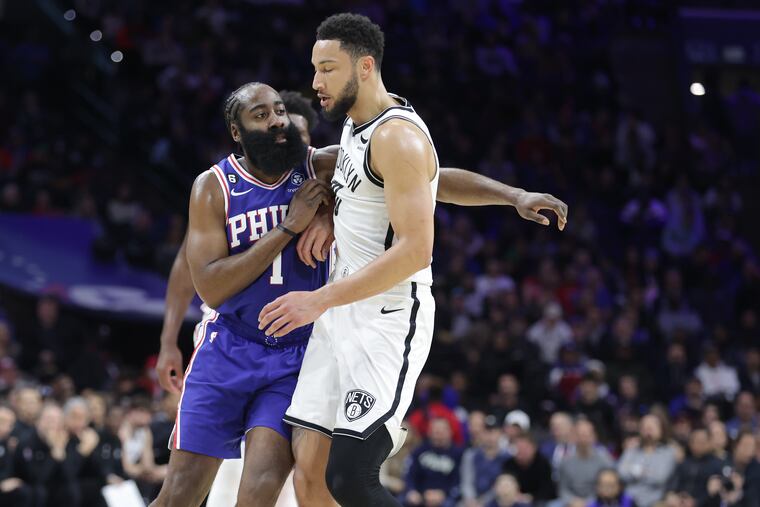NBA backs down from Ben Simmons, emboldens James Harden
A recent bit of legal wrangling over Simmons' holdout reinforces how little leverage the Sixers have with James Harden.

Want to know why James Harden is doing what he is doing?
Want to know why it is going to work?
The only people with the power to stop him can’t figure out how.
The latest example comes to us via a piece of news that is both small in nature and large in implication. It happens to involve a familiar face. According to ESPN, the NBA will credit Ben Simmons with a full year of service time for the 2021-22 season despite the fact that he refused to play for half of it. In doing so, it effectively eliminated the last potential consequence that the former Sixer could have earned himself by staging a holdout and forcing a trade.
» READ MORE: Can the Sixers convince James Harden to stay? It is (still) Daryl Morey’s best option.
Let’s be clear. This was a relatively minor decision, at least in terms of immediate fallout. Simmons’ situation made this a relatively low-stakes fight. Service time mostly serves to set maximum contract terms: The top allowable salary for a player with 0-6 years experience is about $6 million less than a player with 7-9 years experience, which is then about $7 million less than a player with 10-plus years. Simmons almost certainly won’t command a max contract when he hits free agency again after the 2024-25 season. Even if he does somehow rejuvenate his career to that point, he still won’t be in the 10-plus bucket. With a full year of service for 2021-22, he currently has seven years, although he missed his first season with a foot injury. Without the recent development, he would have had six years. So, from a practical standpoint, the whole thing is relatively moot.
But let’s forget about practicality for a moment. Instead, let’s talk about symbolism.
The message to NBA players is clear. There’s no reason not to hold out. In fact, it’s usually the smart move, provided you can stomach the hit to your reputation and the alienation of a fan base and a few months without basketball. And you probably don’t even have to worry about that. After all, a team pretty much has to acquiesce to a player’s trade demand if it knows he can hold out without consequence.
Which brings us to the Sixers’ current stalemate with Harden and the Clippers. Harden wants to be traded. The Sixers want a fair return. But the Clippers know they don’t need to offer a fair return. The player has spoken.
On the one hand, the circumstances are different. That’s true on a couple of different levels:
1) The relationship between Harden and the Sixers has yet to reach the level of acrimony that existed during the Simmons ordeal. Recent reports suggest that Harden intends on reporting to training camp and fulfilling the terms of his contract until a deal is reached. Simmons was actively refusing to see his teammates during his holdout. Harden was partying with them a few weeks ago.
» READ MORE: The return of BBall Paul: Five reasons the Sixers had no choice but to pay Reed real money
2) Both the old and new collective bargaining agreements contain specific language pertaining to players holding out in the final year of their contracts. In a nutshell, the clause says that any player who refuses to play for 30 or more days cannot sign a new contract with another team unless the former team consents. If Harden decided not to show up until the Sixers traded him, he’d run the risk of the Sixers reaching a point where they simply said, fine, have fun in retirement. Conversely, Harden could bet that the Sixers would not be willing to sacrifice four years of a $30 million-plus cap hit.
So, no, the NBA’s Simmons decision does not directly impact the consequences Harden faces if he chooses to hold out. But it does reinforce the true state of play that Daryl Morey and Josh Harris must abide by as they attempt to resolve the situation. At the end of the day, owners do not have the leverage to force even a non-superstar to face any meaningful consequences for a holdout.
Clearly, Simmons’ holdout was a point of contention during the negotiations that led to the newest collective bargaining agreement between the league and the NBA Players Association. According to ESPN, the decision was laid out in a side letter, which is a vehicle that parties in a labor negotiation resort to when they can’t agree on a resolution that both are willing to codify into law. Essentially, the NBA said, “We’re willing to give Ben Simmons a year of service in this instance, but we’re not willing to say that all future Ben Simmonses should get a year of service.”
According to ESPN, officials from “several” teams argued that Simmons should not be credited with a year of service for 2021-22. But, the end result was the end result. The new CBA, presumably, does not include that language. The message is clear. The issue remains unresolved. Tie goes to the player.
Will any of this have a meaningful impact on the Sixers’ dilemma with Harden? Probably not. Nor will it have any meaningful impact on Joel Embiid’s decision-making regarding his future. Players are free to sign contracts — or opt in to them — and deal with the consequences later.
After all, there are no consequences.
» READ MORE: Leadership deficit: Joel Embiid again hints he’d like to leave the Sixers, complains about supporting cast